With the development of trade globalization and the continuous improvement of people’s living condition in China, imported food has become an important source of food for Chinese consumers. The General Administration of Quality Supervision, Inspection and Quarantine of the People’s Republic of China (AQSIQ) attaches great importance to the imported food safety, and supervises the imported food strictly. On 14 July 2017, AQSIQ issued the report of the quality and safety of imported food in China in 2016.
1. The trade of imported food in China in 2016
In 2016, totally 1,324,000 batches of imported food (39.188 million ton, 46.62 billion dollars) were inspected and quarantined by local CIQs. In recently 5 years, the average annual growth rate of trade value reached 2.6%, as shown in figure 1.
In the year of 2016, China imported food from 187 countries or regions, among them, the top 10 regions were: European Union, ASEAN, America, New Zealand, Brazil, Canada, Australia, Russia, South Korea and Chile, occupying a total value of 38.03 billion dollars which accounted for 81.6% of the total value; The imported food categories almost covered all kinds of global excellent foods. Meat, aquatic products, grease and oil, dairy products, grain and products, wine, sugar, beverage, dry nuts and pastry and biscuits are the main imported categories, with a total value of 43.32 billion dollars, which accounted for 92.9% of the total value. More detailed information was shown in the following figures (1-4).
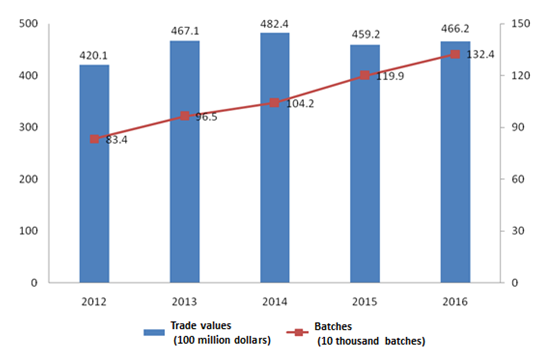
Figure 1 The trade value of imported food in China from 2012 to 2016
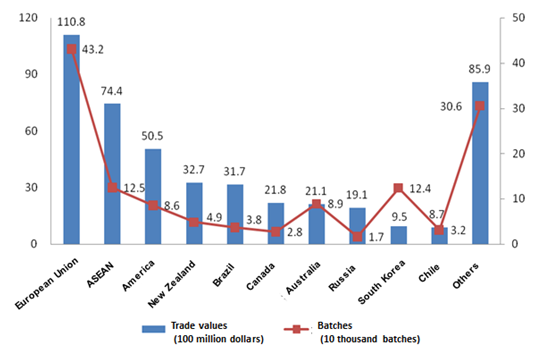
Figure 2 Sources of imported food in China in 2016
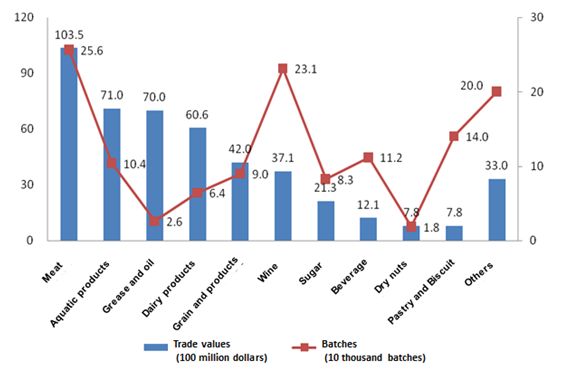
Figure 3 Imported food categories in China in 2016
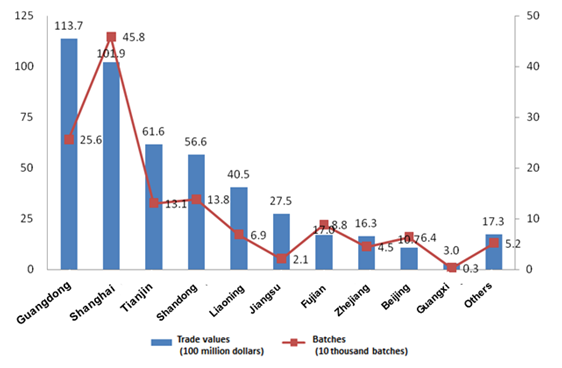
Figure 4 Import ports in 2016
The trade of imported food in large amounts
Among all kinds of imported foods, the imported amount of vegetable oil, milk powder, meat, and aquatic products reached 6,735,000 tons, 965,000 tons, 4,604,000 tons and 3,883,000 tons, respectively. More detailed information was shown in the following figures (5-9).
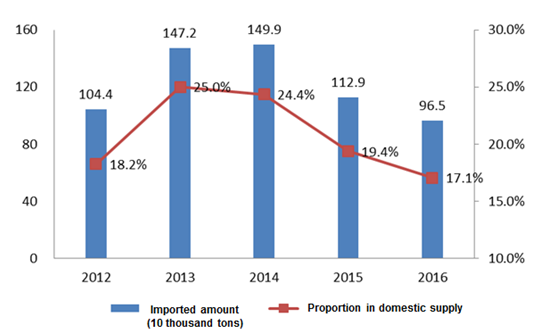
Figure 5 Imported amount and proportion in domestic supply of milk powder from 2012 to 2016
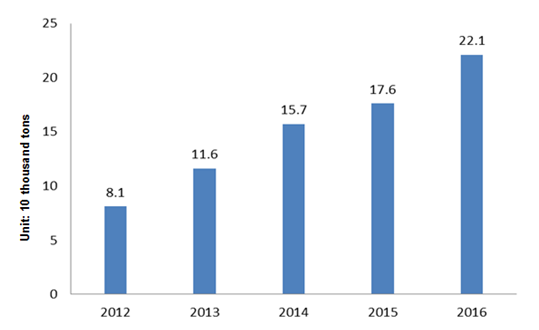
Figure 6 Imported amount of infant formula milk powder from 2012 to 2016
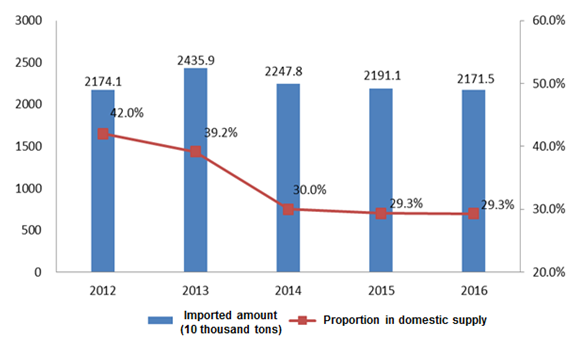
Figure 7 Imported amount and proportion in domestic supply of edible vegetable oil from 2012 to 2016
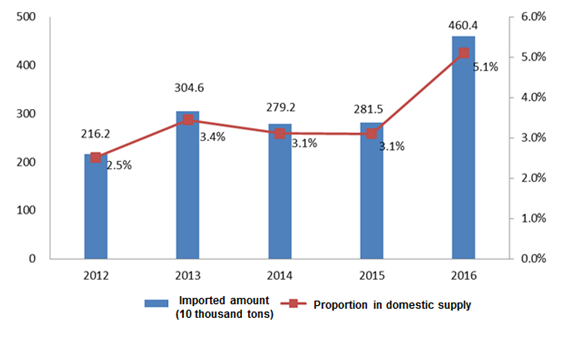
Figure 8 Imported amount and proportion in domestic supply of meat from 2012 to 2016
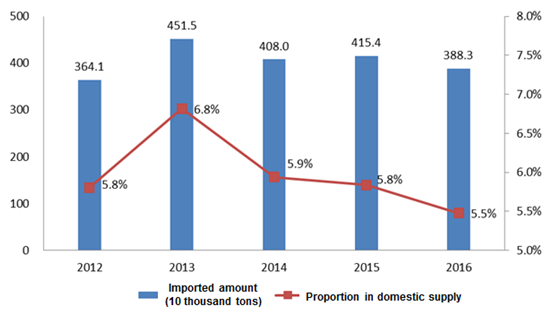
Figure 9 Imported amount and proportion in domestic supply of aquatic products from 2012 to 2016
2. Quality and safety report of imported food in China in 2016
Over these years, the overall situation of the quality and safety of imported food in China remained stable, without serious imported food quality and safety problems occurred. In the year of 2016, 3,042 batches of unqualified imported food (34,549 ton, 56.542 million dollars), from 82 countries or regions, were inspected by local CIQs. Compared with that of same time last year, the unqualified batches increased 8.4% (Figure 5).
Among them, the main unqualified food categories were beverage, pastry and biscuits, grains and products, etc. The reasons for unqualified imported food mainly included: in-compliant food additives, microorganism, unqualified character, etc. More detailed information was indicated in the below figures (10-13).
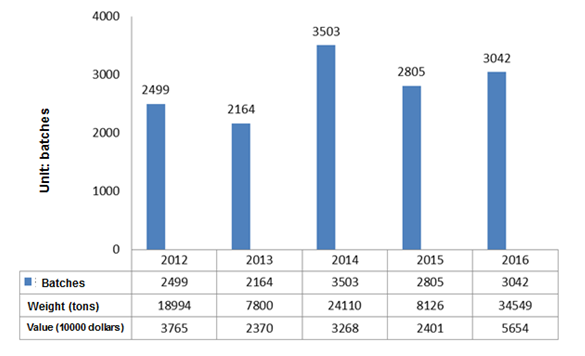
Figure 10 Unqualified imported food from 2012 to 2016
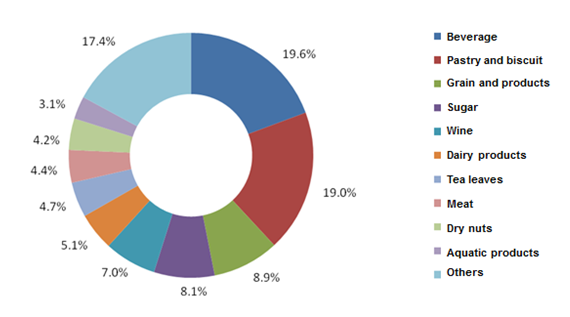
Figure 11 Unqualified imported food categories in China in 2016
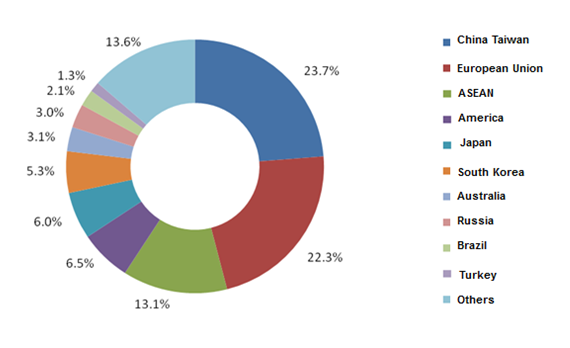
Figure 12 Sources of unqualified imported food in 2016

Figure 13 In-compliant reasons for the unqualified imported food in 2016
The quality and safety of imported food in large amounts
Food category | Quality and safety information |
Dairy product |
|
Edible vegetable oil |
|
Meat |
|
Aquatic products |
|
Chinese government pays close attention to food safety, and AQSIQ has established the supervision system covered all links of “before the import, during the import, after the import”. Therefore, for import enterprises, you shall pay more attention to the Chinese laws and regulations, and make adequate preparations before importing, to confirm your product can be compliant. For example, 1) check if the product category is allowed to import to China or not; 2) design a compliant Chinese label; 3) conduct pre-test according to relevant Chinese national standard to check if the product quality can be compliant or not under Chinese regulation, etc. For more information about the prepackaged food regulatory compliance in China, please kindly click here.
If you have any questions, please contact us at service@cirs-group.com.
Reference

